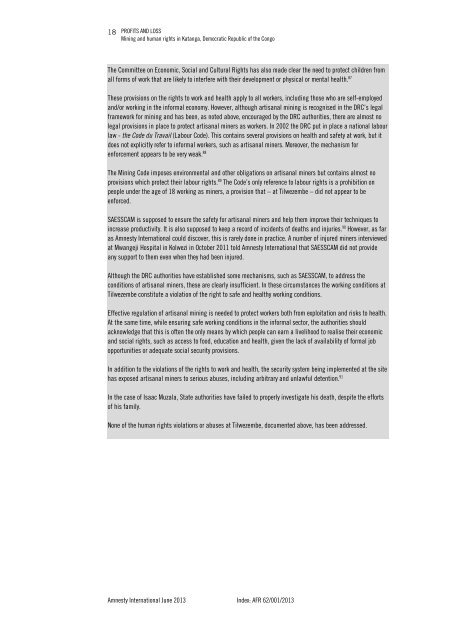Download - Amnesty International Canada
Download - Amnesty International Canada
Download - Amnesty International Canada
Create successful ePaper yourself
Turn your PDF publications into a flip-book with our unique Google optimized e-Paper software.
18<br />
PROFITS AND LOSS<br />
Mining and human rights in Katanga, Democratic Republic of the Congo<br />
The Committee on Economic, Social and Cultural Rights has also made clear the need to protect children from<br />
all forms of work that are likely to interfere with their development or physical or mental health. 87<br />
These provisions on the rights to work and health apply to all workers, including those who are self-employed<br />
and/or working in the informal economy. However, although artisanal mining is recognised in the DRC’s legal<br />
framework for mining and has been, as noted above, encouraged by the DRC authorities, there are almost no<br />
legal provisions in place to protect artisanal miners as workers. In 2002 the DRC put in place a national labour<br />
law - the Code du Travail (Labour Code). This contains several provisions on health and safety at work, but it<br />
does not explicitly refer to informal workers, such as artisanal miners. Moreover, the mechanism for<br />
enforcement appears to be very weak. 88<br />
The Mining Code imposes environmental and other obligations on artisanal miners but contains almost no<br />
provisions which protect their labour rights. 89 The Code’s only reference to labour rights is a prohibition on<br />
people under the age of 18 working as miners, a provision that – at Tilwezembe – did not appear to be<br />
enforced.<br />
SAESSCAM is supposed to ensure the safety for artisanal miners and help them improve their techniques to<br />
increase productivity. It is also supposed to keep a record of incidents of deaths and injuries. 90 However, as far<br />
as <strong>Amnesty</strong> <strong>International</strong> could discover, this is rarely done in practice. A number of injured miners interviewed<br />
at Mwangeji Hospital in Kolwezi in October 2011 told <strong>Amnesty</strong> <strong>International</strong> that SAESSCAM did not provide<br />
any support to them even when they had been injured.<br />
Although the DRC authorities have established some mechanisms, such as SAESSCAM, to address the<br />
conditions of artisanal miners, these are clearly insufficient. In these circumstances the working conditions at<br />
Tilwezembe constitute a violation of the right to safe and healthy working conditions.<br />
Effective regulation of artisanal mining is needed to protect workers both from exploitation and risks to health.<br />
At the same time, while ensuring safe working conditions in the informal sector, the authorities should<br />
acknowledge that this is often the only means by which people can earn a livelihood to realise their economic<br />
and social rights, such as access to food, education and health, given the lack of availability of formal job<br />
opportunities or adequate social security provisions.<br />
In addition to the violations of the rights to work and health, the security system being implemented at the site<br />
has exposed artisanal miners to serious abuses, including arbitrary and unlawful detention. 91<br />
In the case of Isaac Muzala, State authorities have failed to properly investigate his death, despite the efforts<br />
of his family.<br />
None of the human rights violations or abuses at Tilwezembe, documented above, has been addressed.<br />
<strong>Amnesty</strong> <strong>International</strong> June 2013 Index: AFR 62/001/2013


